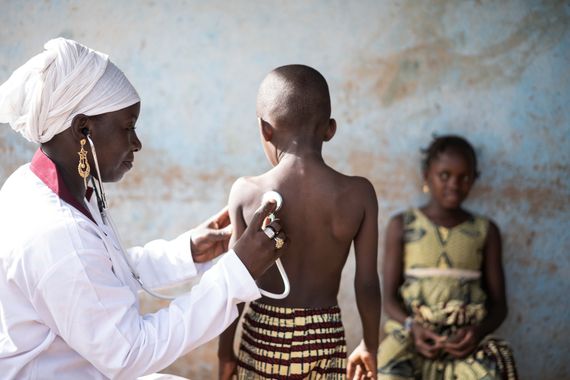8 July 2024

Personalising Tuberculosis Treatment
Background
Tuberculosis (TB) is a silent pandemic claiming over 1.5 million lives annually. In West Africa, diverse TB-causing mycobacterial species pose challenges to accurate diagnosis and treatment, as different species require different treatments. Dr. Augustina Sylverken, from the KNUST Ghana and an advisor to Ghana's National Tuberculosis Control Programme (NTP), recognized the need for a species-specific diagnostic tool. Partnering with Dr. Suzie Hingley-Wilson from the University of Surrey, they aimed to pioneer a rapid diagnostic test tailored to West Africa's needs.
How Vidiia Got Involved
Vidiia collaborated with Dr. Suzie Hingley-Wilson and Dr. Augustina Sylverken to enhance their TB diagnostic test. Leveraging Vidiia's Assay Development Programme (ADP), we meticulously refined their test, importing to our VH6 device with innovative artificial intelligence technology to optimise its performance and accessibility. Our goal was not only to improve the efficacy of TB diagnosis but also to package it into a solution that could be easily replicated outside the lab, allowing accessible diagnostics too hard to reach testing sites and those most in need.
Key Features:
Personalised Treatment Plans: The test identifies TB-causing species, which require different treatments, enabling tailored treatment plans. For example, it accurately identifies M. bovis which is resistant to a frontline antimicrobial, this diagnosis aids informed drug selection.
Monitoring M. africanum's Susceptibility: The test alerts clinicians to monitor M. africanum patients more closely, improving treatment effectiveness and patient outcomes.
Mixed Infection Diagnosis: The diagnostic platform can diagnose patients that have more than one species, which is often missed in culture diagnostics. Allowing personalised treatments which both species are susceptible to, preventing patients relapsing with the unsusceptible species.
Monitoring Local Species Diversity: The diagnostic platform enables early detection of outbreaks and proactive intervention strategies.
Journey So Far
The original PCR test has been converted into an affordable, portable AI-LAMP test. The Ghanaian NTP kindly donated samples, with the KNUST, Ghana, hosting the trial which allowed for refinement and optimisation. The project is up for selection as a Research Excellence Framework (REF) Case Study for the next REF cycle.
Further Impact
Funding is being raised for a pilot and impact study with the Ghanaian NTP to determine the clinical sensitivity and specificity of the test. This will involve three clinics from around Ghana, bringing the diagnostic closer to those in need.
Outcomes of the Assay Accelerator Service Stages:
Design - Conversion of previous PCR primers to LAMP primers
Development - Data set of the selected primers on reference strains and synthetic DNA, including LOD studies.
Optimisation and Validation – Data set on MTBC samples in Ghana with comparison to PCR. Refinement of primers.
Adoption and Impact testing - Data set and Impact study on testing in low infrastructure setting to come.

